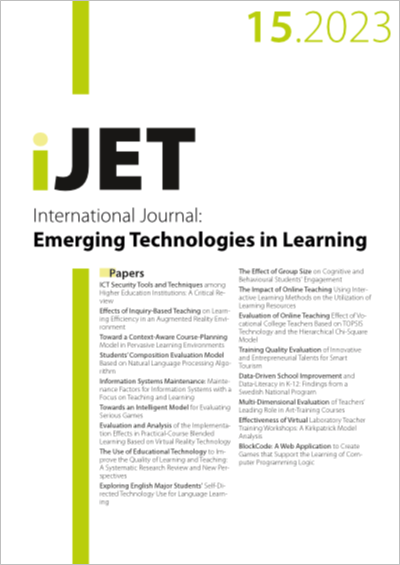Students’ Composition Evaluation Model Based on Natural Language Processing Algorithm
DOI:
https://doi.org/10.3991/ijet.v18i15.42383Keywords:
natural language processing; students’ composition evaluation; multi-task learning frameworkAbstract
It is subjective, time consuming and labor intensive to evaluate students’ compositions. Use of natural language processing (NLP) technology effectively improves the evaluation efficiency and reduces the burden on teachers. In order to overcome the problems of traditional models, such as over-fitting and poor generalization ability, this research studied a students’ composition evaluation model based on an NLP algorithm. A students’ composition evaluation model based on a multi-task learning framework was proposed, which completed three sub-tasks simultaneously using the NLP algorithm. Three different encoding methods were used; namely, convolutional neural network (CNN), recurrent neural network (RNN), and long short-term memory (LSTM), which captured text information from multiple perspectives. A new pairing pre-training mode was built, which aimed to help build an NLP-based students’ composition evaluation model based on the multi-task learning framework, thus alleviating the deviation caused by excessive correlation. The experimental results verified that the constructed model and the proposed method were effective.
Downloads
Published
How to Cite
Issue
Section
License
Copyright (c) 2023 Nan Zhang (Submitter); Lin Wang, Weifeng Deng

This work is licensed under a Creative Commons Attribution 4.0 International License.
The submitting author warrants that the submission is original and that she/he is the author of the submission together with the named co-authors; to the extend the submission incorporates text passages, figures, data or other material from the work of others, the submitting author has obtained any necessary permission.
Articles in this journal are published under the Creative Commons Attribution Licence (CC-BY What does this mean?). This is to get more legal certainty about what readers can do with published articles, and thus a wider dissemination and archiving, which in turn makes publishing with this journal more valuable for you, the authors.
By submitting an article the author grants to this journal the non-exclusive right to publish it. The author retains the copyright and the publishing rights for his article without any restrictions.



